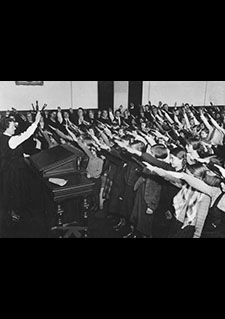Everyday Protest
In everyday life as well, ultimately only a few Christians resisted the Nazi state’s directives. Anyone who did not fall in line with political developments was frightened by threatening punishments and terror. The chief instrument used to enforce loyalty to the system was the “Law against Treacherous Attacks on the State and Party and for the Protection of Party Uniforms” of December 20, 1934.
Minor forms of social disobedience, which were quite widespread, included not attending Nazi rallies or clinging to transmitted customs and symbols. Refraining from the Nazi salute was a widespread form of protest and assertion. Pastors, who forbade their confirmands to give the Nazi salute in confirmation class, could be denounced quickly.
Retired mail distribution clerk Ferdinand Puzich also rejected the “Heil Hitler salute“. The East Prussian Pietist was convinced that salvation could not be found in any person except Christ. He supposedly still refused to give the Nazi salute even in Sachsenhausen concentration camp; he died there presumably as a result of maltreatment. Merely selectively nonconformist behavior could have drastic consequences for an individual.

